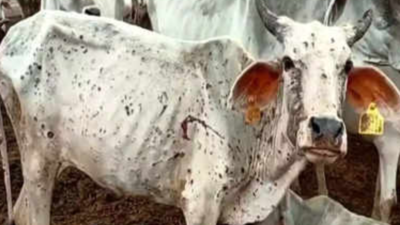- News
- City News
- gurgaon News
- Worst over? Lumpy skin disease cases see a drop in Haryana, vax coverage up
Worst over? Lumpy skin disease cases see a drop in Haryana, vax coverage up

Image used for representational purpose only
GURUGRAM: Fewer cases of cattle infected with the lumpy skin disease are being reported daily, officials said on Wednesday, attributing the shrinking outbreak to the state's door-to-door vaccination drive and the awareness campaign.
Officials said less than 1,000 new cases of the infection are being recorded every day - half of what the daily figures were last month, when the outbreak was swelling.
Haryana has reported 90,000 cases of the skin disease among cattle, of which around 64,000 have recovered. There are currently 26,000 cattle with active infections, and mortality rate is low, according to official data.
In vaccinations, officials said over 80% of all of 20 lakh cattle in the state have been inoculated against the viral infection.
"We have done far better than other states. We acted early and started tracing the affected cattle. We were also the first state to roll out a mass vaccination programme free of cost to the farmers and dairy owners. At present, we have less than 26,000 active cases and the recovery rate is above 60%, which puts us in a better position than other states in effectively curbing the outbreak," said Birendra Singh Laura, director-general, department of animal husbandry and dairying.
In Gurugram, officials said the vaccination figures were even higher, at 96%.
"Of the over 64,000 cattle in the district, about 62,000 have been vaccinated so far," said Dr Punita Gehlawat, deputy director, animal husbandry department.
TOI had reported that over 2.5 lakh cattle had been vaccinated against the skin disease in Haryana till last month. Going by the latest government figures, this would mean that around 13.5 lakh cattle have been vaccinated in the last 7 days - averaging it to around 2 lakh daily.
"We are not vaccinating any infected animal at present and the remaining will be completed in the next few days. We have been able to do so because we took preemptive measures such as banning the movement and trade of cattle. We also mobilised students and college teachers, and engaged volunteers for the awareness campaign," Laura said.
The pox-like infection is caused by a virus (in the capripoxvirus genus) that rapidly spreads by insects such as ticks, and mosquitoes. Currently, the vaccines administered for it are the goat and sheep pox shots that give cross immunity for viruses in the same genus.
Officials said less than 1,000 new cases of the infection are being recorded every day - half of what the daily figures were last month, when the outbreak was swelling.
Haryana has reported 90,000 cases of the skin disease among cattle, of which around 64,000 have recovered. There are currently 26,000 cattle with active infections, and mortality rate is low, according to official data.
In vaccinations, officials said over 80% of all of 20 lakh cattle in the state have been inoculated against the viral infection.
"We have done far better than other states. We acted early and started tracing the affected cattle. We were also the first state to roll out a mass vaccination programme free of cost to the farmers and dairy owners. At present, we have less than 26,000 active cases and the recovery rate is above 60%, which puts us in a better position than other states in effectively curbing the outbreak," said Birendra Singh Laura, director-general, department of animal husbandry and dairying.
In Gurugram, officials said the vaccination figures were even higher, at 96%.
"Of the over 64,000 cattle in the district, about 62,000 have been vaccinated so far," said Dr Punita Gehlawat, deputy director, animal husbandry department.
TOI had reported that over 2.5 lakh cattle had been vaccinated against the skin disease in Haryana till last month. Going by the latest government figures, this would mean that around 13.5 lakh cattle have been vaccinated in the last 7 days - averaging it to around 2 lakh daily.
"We are not vaccinating any infected animal at present and the remaining will be completed in the next few days. We have been able to do so because we took preemptive measures such as banning the movement and trade of cattle. We also mobilised students and college teachers, and engaged volunteers for the awareness campaign," Laura said.
The pox-like infection is caused by a virus (in the capripoxvirus genus) that rapidly spreads by insects such as ticks, and mosquitoes. Currently, the vaccines administered for it are the goat and sheep pox shots that give cross immunity for viruses in the same genus.
FOLLOW US ON SOCIAL MEDIA
FacebookTwitterInstagramKOO APPYOUTUBE
Start a Conversation
end of article









